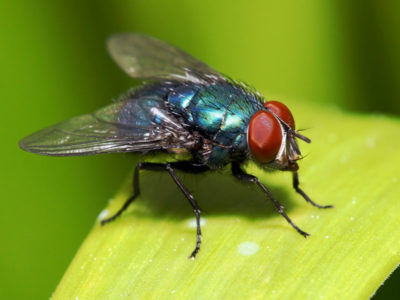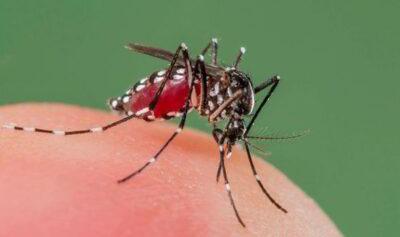|
Listen To The Article
|
The outdoors is a great place to be, but the enjoyment quickly can turn to annoyance when the bugs find you. Flies and mosquitoes not only deliver a painful bite but can also expose you to disease. You could douse yourself in a store-bought, Deet-based bug spray — or you could go a more natural route.
The very first step in battling bugs is to prevent them from reproducing. You could focus on killing off the adults, but if they’ve already laid eggs you will be faced with the same problem again shortly.
Here are four tips on stopping their reproduction:
1. Keep Trash Locked Up Tight
Where there is loose trash, you can bet there will be flies. Particularly nasty, wet trash or trash with food are perfect breeding grounds for many species of flies. Houseflies can breed quite rapidly under the right conditions so keep your indoor trashed in a fly-proof, air-tight garbage can.
If you live in a rural area like me and only take your trash to the dump weekly or even every few months, try to double-bag your trash and keep bags in an outdoor area protected from insects, rodents, etc. Try your best to compost food rather than putting it in your trash.
The Best Chemical-Free, All-Natural Insecticide — For Your Garden AND Home?
2. Get Rid of Stagnant Water Sources
Mosquitoes are easily one of the most annoying insects with which to deal. Thankfully, these insects don’t have a very long lifespan and you can seriously cut back on your problem by getting rid of stagnant water. ‘Skeeters need water to reproduce and by getting rid of these sources, the adults will have to go elsewhere.
3. Refill Troughs and Standing Water Every Week
Completely dump and refill any water troughs or other sources of standing water a minimum of once a week. This will halt the reproduction cycle of the mosquito, because any larvae will be killed once exposed to the air and sun. Don’t forget about pet bowls, bird baths and even upturned flower pots that may have collected water in your garden.
4. Muck Out Manure Regularly
If you have livestock, you need to stay on top of removing manure on a regular basis, especially in the summer. Whether you have a flock of chickens or a whole barnyard of critters, scoop up that poop and move it as far away from your barn and home as possible.
Reducing Exposure to Insects
But what if you already have lots of insects, and you need help today? Here are some tips for reducing bites and getting rid of adult insects.
1. Keep Compost Piles Away From House
A properly kept compost pile should be too hot to allow fly eggs to hatch, but flies may still be attracted to them. Keep your compost piles away from your house and if you find eggs hatching in your pile, do some research into proper compost pile care.
2. Stay on Top of Mowing Your Lawn
Chiggers, ticks, fleas and other biting creatures find long grass particularly inviting. To reduce bites, keep your lawn mowed down to two to four inches. This is very important if you have kids and pets. In fact, if you live in a region with bad tick and chigger problems, you may want to do away with grass for your kid’s or pet’s play areas and use gravel or some such substitute.
The Most Valuable Household Substance In The World.
3. Cut Back Vegetation and Shrubs Around Walkways
Aside from your lawn, keep shrubs and other plants cut back around areas that you walk through often. This includes low-hanging tree branches.
4. Treat Your Indoor/Outdoor Pets With a Flea/Tick/Insect Repellent
Dogs and cats not only suffer alongside us when it comes to biting insects but also can be carriers, bringing these bugs right into our homes. It is a good idea for any indoor/outdoor cats and dogs to be treated with some type of insect repellent. There are plenty of commercial products but if you prefer natural products, you can often use the same DIY repellent recipes for people (one will be featured below). It is always wise to check with your veterinarian before using any repellents on your pets.
5. Set Up Effective Traps
There are tons of traps on the market and most work pretty well. You can find traps for flies, mosquitoes, yellow jackets and other bugs. Here are some DIY traps you can try:
6. Use Fly Tape
Fly tape is usually super cheap (50 to 75 cents, apiece) and effective. The tape can be put up anywhere and unlike many fly traps, it doesn’t usually have a gross-smelling bait. Most tapes can be used indoors, though they are fairly unsightly. I find that my fly tape collects quite a few different types of flies as well as other flying, biting insects.
7. Fight Back with Fowl
If you have space for some birds and live in an area with a tick problem, I highly recommend getting Guinea Fowl. These prehistoric-looking birds will gladly eat up various biting insects around your property.
8. Make Your Own Insect-Repelling Candles
For outdoor activities, especially if you are just sitting around relaxing, citronella candles can be very useful in repelling bugs. Rather than wasting money on expensive store-bought candles, you can make your own.
9. Use a Natural Bug Repellent
Deet bug repellents definitely work, but they are not a natural option. You can make your own repellent with essential oils that are safe for most any person, child and pets. You can find different recipes for mosquito repellant here.
10. Treating Insect Bites
It’s inevitable that you will get some bug bites. Most bites sting, itch badly, swell up and can even turn into an open wound if you scratch them. You can easily make a bug bite salve at home with a few ingredients:
- 2 tablespoons shea butter
- 2 tablespoons avocado oil
- 1 ounce beeswax
- ¼ teaspoon calendula oil
- 5-10 drops lavender oil
- 5-10 drops tea tree oil
Melt these ingredients and pour into small containers. You can pour some into a larger glass container for use in the home, but I think using lip balm tins or empty chapstick tubes is a good idea. That way you can simply pop one into your pocket before you head outdoors.
Bugs can be a real pain, but you can reduce your problems by following these simple tips.
Please share any of your own tips or tricks, bug traps or bite salves, and any other helpful information in the comment section below!
Discover The Trick To Saving Thousands At The Grocery Store. Read More Here.
 Off The Grid News Better Ideas For Off The Grid Living
Off The Grid News Better Ideas For Off The Grid Living





